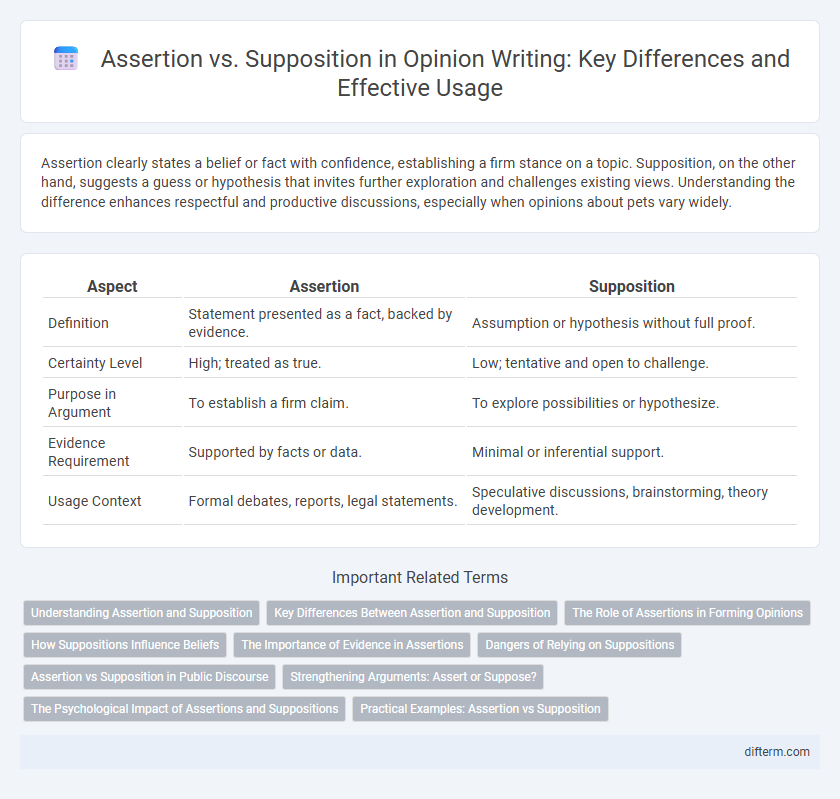Assertion clearly states a belief or fact with confidence, establishing a firm stance on a topic. Supposition, on the other hand, suggests a guess or hypothesis that invites further exploration and challenges existing views. Understanding the difference enhances respectful and productive discussions, especially when opinions about pets vary widely.
Table of Comparison
| Aspect | Assertion | Supposition |
|---|---|---|
| Definition | Statement presented as a fact, backed by evidence. | Assumption or hypothesis without full proof. |
| Certainty Level | High; treated as true. | Low; tentative and open to challenge. |
| Purpose in Argument | To establish a firm claim. | To explore possibilities or hypothesize. |
| Evidence Requirement | Supported by facts or data. | Minimal or inferential support. |
| Usage Context | Formal debates, reports, legal statements. | Speculative discussions, brainstorming, theory development. |
Understanding Assertion and Supposition
Assertion presents a statement with confidence and claims it as truth, relying on evidence or authority to support the stance. Supposition involves forming a hypothesis or assumption without conclusive proof, often serving as a basis for further investigation or debate. Differentiating between assertion and supposition enhances critical thinking and effective communication in argumentation.
Key Differences Between Assertion and Supposition
Assertion presents a statement as a definitive truth supported by evidence or conviction, while supposition involves a hypothesis or assumption made without firm proof. Assertions are typically declared with confidence and invite acceptance, whereas suppositions serve as starting points for further inquiry or debate. Understanding these distinctions clarifies how opinions are formed and communicated in discourse.
The Role of Assertions in Forming Opinions
Assertions play a crucial role in forming opinions by providing clear, confident statements that shape individual beliefs and perspectives. Unlike suppositions, which are tentative and exploratory, assertions establish a foundation of certainty that influences decision-making and public discourse. Effective assertions rely on evidence and conviction, making them powerful tools in persuading others and solidifying personal or collective viewpoints.
How Suppositions Influence Beliefs
Suppositions play a crucial role in shaping beliefs by providing hypothetical frameworks that guide reasoning and interpretation of evidence. Unlike assertions, which declare information as factual, suppositions invite critical thinking and open exploration, allowing individuals to reevaluate or reinforce their perspectives based on new possibilities. This dynamic interaction between suppositions and beliefs fosters adaptability and growth in personal and collective understanding.
The Importance of Evidence in Assertions
Assertions carry weight only when backed by concrete evidence, distinguishing informed opinions from mere suppositions. Evidence provides credibility and substantiates claims, allowing audiences to differentiate fact-based assertions from unfounded assumptions. The rigorous evaluation of data and sources is essential to maintain intellectual integrity and foster meaningful discourse.
Dangers of Relying on Suppositions
Relying on suppositions can lead to flawed decision-making because assumptions lack empirical evidence and can reinforce biases or misinformation. Suppositions often create a false sense of certainty, causing individuals to overlook critical facts or alternative viewpoints. This overdependence on unverified claims risks perpetuating errors and undermines the foundation of rational judgment.
Assertion vs Supposition in Public Discourse
Assertion in public discourse establishes statements as definitive claims backed by evidence or authority, fostering clarity and accountability in communication. Supposition, by contrast, presents ideas as hypotheses or beliefs without firm proof, encouraging exploration but also inviting ambiguity or misinterpretation. Effective public discourse balances assertion's confidence with supposition's openness to ensure both credibility and adaptability in debates.
Strengthening Arguments: Assert or Suppose?
Assertive statements provide clear, confident foundations that strengthen arguments by conveying certainty and authority, which enhances persuasiveness. Suppositional claims, while useful for exploring possibilities, often weaken argument strength due to inherent uncertainty and lack of definitive evidence. Effective argumentation prioritizes assertive language to establish credibility and influence audience acceptance decisively.
The Psychological Impact of Assertions and Suppositions
Assertions reinforce confidence by presenting statements as facts, which can shape beliefs firmly and influence decision-making processes. Suppositions invite exploration and critical thinking, fostering openness to alternative perspectives and reducing cognitive rigidity. The psychological impact hinges on how these forms guide perception, with assertions often anchoring convictions and suppositions promoting intellectual flexibility.
Practical Examples: Assertion vs Supposition
Assertions provide clear, confident statements supported by facts, such as "The company increased its revenue by 20% last quarter," while suppositions involve assumptions without full evidence, like "The market might grow if trends continue." In legal cases, an assertion could be a witness's direct claim of seeing an event, whereas a supposition might be the inferred motive behind the crime. Distinguishing between assertion and supposition is crucial for critical thinking and decision-making in everyday scenarios and professional judgments.
assertion vs supposition Infographic

 difterm.com
difterm.com